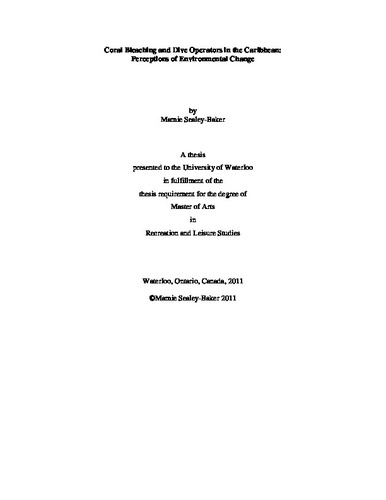| dc.description.abstract | Dive tourism is a growing and important industry which is often reliant on a high quality natural environment. As dive tourism’s significance grows due to its economic and ecological impacts on many tropical destinations, it is important to understand how this special-interest tourism may be affected by environmental change. Mass coral bleaching episodes, a phenomenon with potentially severe implications for the health of coral reef ecosystems, have been increasing in intensity and frequency over the last three decades. This has begun to affect the enjoyment of visitors and the prosperity of individuals and dive tourism businesses that depend on reefs. Therefore, the purpose of this project is to explore the perceptions, opinions and adaptation strategies of dive operators in the Caribbean regarding coral bleaching and its effects on their business and dive tourism.
This study was guided by an exploratory, sequential, mixed methods design and consisted of two phases: phase 1, a semi-structured interview, followed by phase 2, a web-based survey. The interviews for the initial phase were done with seven Tobago dive operators in January 2011 to gain perspectives and insights from local dive operators before the web-based survey was sent out. The themes that emerged from the interviews include: a lack of government action, locals and reefs, bleaching and business, and moving forward.
A larger regional web-based survey was chosen for a second phase of the study to test operator opinions across the Caribbean. In total 318 operators were contacted, with 90 completing the survey. The results were varied, but the overall consensus was that coral bleaching is an important issue, but at the present time a lack of reef protection is more important. Into the future the issues of coastal development and climate change become more prominent. Based on the 2010 coral bleaching event, which was projected by NOAA to rival that of the 2005 mass bleaching, the 2010 paled in comparison. The operators said it was not as severe as previous bleaching events and that it in fact did not have any impact on their business. | en |

